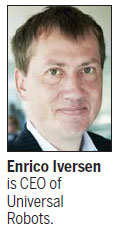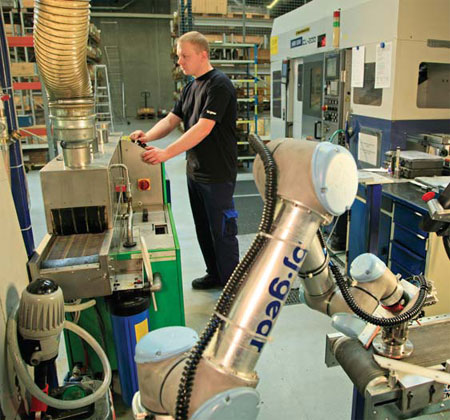Automatons' steely eyes fixed on the prize
Updated: 2012-10-05 08:53
By Zhong Nan (China Daily)
|
|||||||||||
|
Universal Robots plans to localize production in China if business picks up. Provided to China Daily |
For some robot makers, big is not bad, but small is better
As giant robot makers scramble to set up assembly lines in China's heavy industry, their smaller rivals have found another revenue stream - selling small robots to the nation's small and medium-sized enterprises.
Chinese businesses bought 22,600 industrial robots at home and overseas last year, and about 32 percent of them were bought by SMEs, the China Machinery Industry Federation says. It forecasts that the figure will rise to 45 percent this year.
 |
Adept Technology Inc of the US, a Nasdaq-listed robot maker, says it believes China's service robot sector will expand greatly over the next 10 years and beyond, and last year opened an office in Shanghai.
"There has been bigger demand in certain industrial sectors in the last decade in China, for example automotive industry," says Mu Bin, program manager of Adept Technology (Shanghai) Co Ltd. "We expect even greater growth in many other sectors in the next three to five years, focusing on consumer products such as electronics, food and beverages.
"Our partners in China have enjoyed greater sales compared with those of our partners elsewhere. The demand here is astonishing."
Some of the robot makers regarded as the best, such as Kuka AG of Germany and Fanuc Ltd of Japan, offer comprehensive service, from shipment to setting up assembly lines at buyers' plants, whereas their rivals, looking to reduce costs, work with integration partners to set up assembly lines in SMEs.
Adept is using that approach to sell its products in China. Its Chinese integration partners act as intermediaries, using their own technologies to install robots on assembly lines or plants. They also offer buyers customized solutions or design software.
Adept has more than 60 local integration partners in China, and has sold more than 100 robots in the country, bringing in $3 million (2.33 million euros) last year; the company's global sales reached $70 million.
"In China, robots are being largely used in auto factories, aircraft assembly plants and other heavy industry facilities," Mu says.
"The market seems to be saturated, and there is no space to grow. We are also trying to make light, high-speed and precision applications to meet the demand from the nation's service sector, where there is less competition."
At present the company's focus is on developing in the electronic assembly and packaging market. It has already introduced mobile robots to China and is looking to further expand in areas such as hospitals, warehouses and entertainment facilities. Most of its buyers are in the Yangtze River Delta.
"As the standard of living improves steadily in China, we expect tremendous growth domestically, particularly with consumer-related products. Food and medical packaging industries have become new growth points for robots," Mu says. "Chinese dairy producers such as Yili Industrial Group Co Ltd of Inner Mongolia and Wondersun Dairy Co of Heilongjiang province are all using our high-speed assembly lines to pack their products."
Universal Robots AS is another company that is pinning its hopes on China's demand for robots expanding beyond the automotive and heavy-machinery industries. The Danish robot maker wants to localize in China within three years if sales grow as it expects.
"Robots will ensure that Chinese SMEs can stay competitive, and even more robots will play an important role in China's transition from being a low-cost manufacturer to quality-product manufacturer," say Enrico Iversen, CEO of Universal Robots.
Universal Robots, which entered the Chinese market last December, has 10 distributors in the country, with business covering Beijing, Shanghai, Chongqing and cities in Guangdong, Fujian and Jiangsu provinces. Two types of robotic arms it sells are being used in China's household-appliances, auto-parts, general-commodity, painting, machinery, electroplating, micro-motor, medical, education, vision and automated-guided-vehicle industries.
Its products are targeted at small and medium-sized companies or first-time buyers, who regard robots as being too expensive, cumbersome, and hard to program and integrate in existing production.
"The lightweight, flexible robotic arms can work alongside personnel and generally require no safety shielding," Iversen says.
"They are easily moved around the production area and present a plug-and-play solution, and a simple user interface lets employees with no previous programming experience quickly set up and operate them."
Bai Xuefeng, director of the trade department at the China Chamber of Commerce for Import and Export of Machinery and Electronic Products, says the global financial crisis has presented challenges to SMEs, including their being unable to employ additional workers or equip new machines, concerned about receiving orders from overseas, managing credit, and reducing labor and material costs.
"So automation is an effective solution. It relieves employees of monotonous, hard work so they can do far more challenging tasks.
"In China many easy programmable and safe robots will be put into use in numerous industries and in various applications. Assembly applications are one of these, and they will play an important role in the future."
zhongnan@chinadaily.com.cn
(China Daily 10/05/2012 page13)
Today's Top News
Rescuers race against time for quake victims
Telecom workers restore links
Coal mine blast kills 18 in Jilin
Intl scholarship puts China on the map
More bird flu patients discharged
Gold loses sheen, but still a safe bet
US 'turns blind eye to human rights'
Telecom workers restore links
Hot Topics
Lunar probe , China growth forecasts, Emission rules get tougher, China seen through 'colored lens', International board,
Editor's Picks

|

|

|

|

|

|






